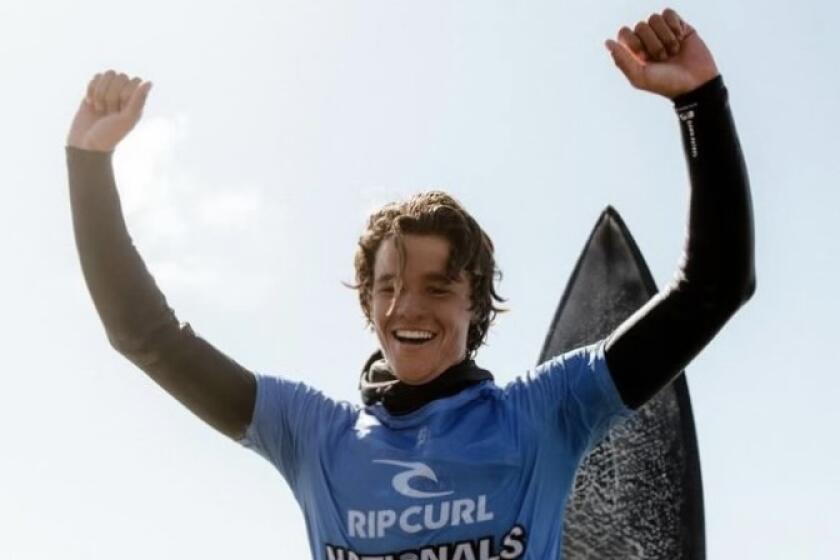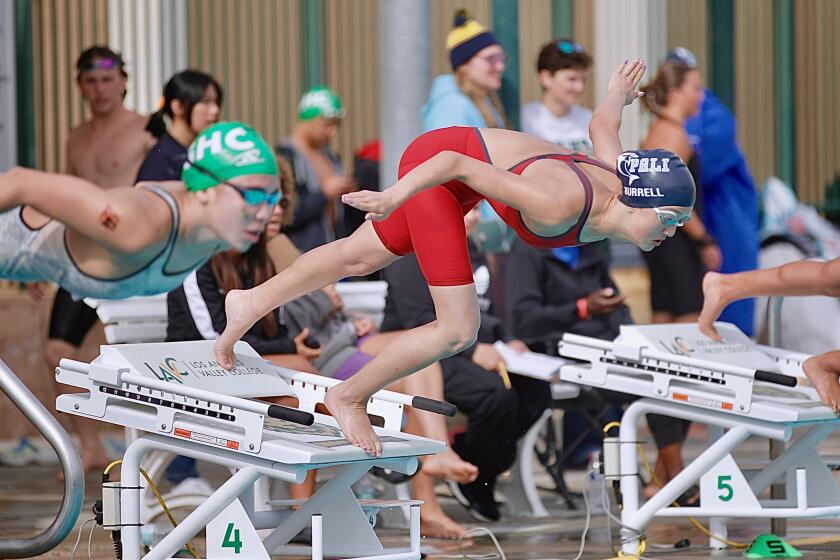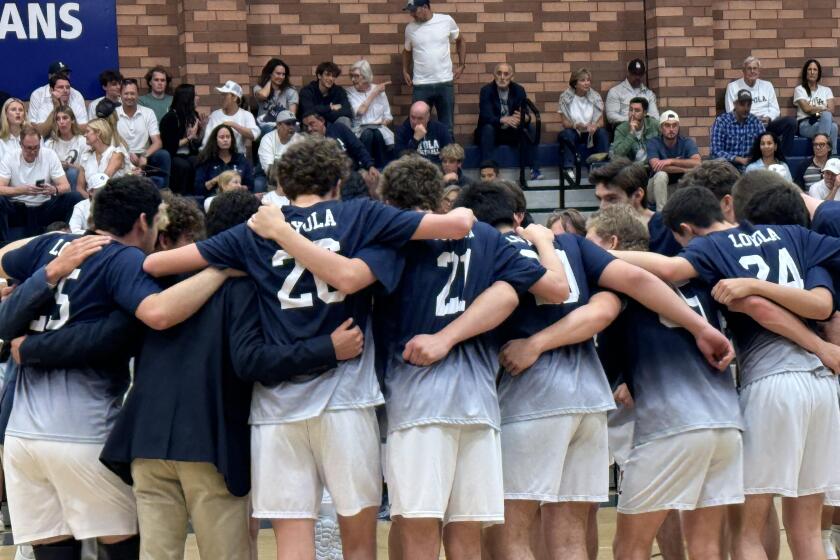Crew Classic Becomes Boston Sea Party
The San Diego Crew Classic took place on Mission Bay Sunday, but the real winner was the Charles River.
Harvard, the institution of higher rowing, won its fifth Copley Cup in eight trips to the San Diego Crew Classic. The men’s varsity 8 defeated Washington, which won last year amid much controversy.
The Harvard boathouse is roughly a mile from the Boston University boathouse. Both are on the Charles River. Harvard has been receiving invitations for years to the Crew Classic; BU got its first invitation this year. Ensuring they will get a second invitation, the BU women won the Whittier Cup by nearly five seconds over UCLA, the defending champion.
That made the Charles River a double winner.
“We just sort of pass each other in the river and wave to each other,” Harvard Coach Harry Parker said. “(BU Coach Anna Considine) has done a great job. What they did was quite an accomplishment.”
Which is not to sell Harvard short. It overcame UCLA just 400 meters into the 2,000-meter race, then pulled away from Washington at 600 meters. Harvard clocked 5 minutes 52.74 seconds, Washington 5:56.29, Pennsylvania 5:58.63 and UCLA 5:59.29.
Washington won last year’s race over Harvard but a appeal by Wisconsin forced a re-row. Harvard won; Washington was last. Several days later, the re-row was overturned, giving Washington the victory, but the athletes were cheated out of the revelry of the moment.
“That’s a good point,” Washington Coach Bob Ernst said. “It made for a very uncomfortable trip home. It was that way for about a week.”
But Ernst was pleased to finish second this year without the controversy.
“We’re not satisfied with second place, but we’re proud to have second over the people we raced today,” he said. “This was clearly the best field this event has ever had. I was just hoping we could get into the finals. . . . This was nuclear warheads from 10 paces. (The field) is almost so awesome, it’s scary.”
BU, which was fifth in the Eastern Sprints and won all its fall races, got its first invitation and some financial support from the Crew Classic. Now the crew is a champion.
Considine, in her sixth year at BU, said her team broke the race into four 500-meter sections.
“We didn’t really have a specific strategy, just work very hard from beginning to end,” she said.
UCLA led at 1,000 meters but BU’s steady pace overcame the Bruins.
“The race really didn’t begin until 1,000 meters,” Considine said.
San Diego is the first stop on the six-event FISA World Cup Series to determine the world’s best rower and Canada’s Silken Laumann and Poland’s Kajetan Broniewski made the most of it. Broniewski upset Christian Haendle, 1990 West German champion, and Soviet Juri Jaanson, the defending series champion, in the men’s race.
“I didn’t expect (Broniewski) to win,” said Haendle, third in last year’s World Cup Series.
Haendle would have been even more surprised to find that Broniewski won despite using oars he was not used to. His special lightweight oars were broken in six places in transit from Frankfurt, Germany, to San Diego. Broniewski tried to collect reimbursement for the oars from American Airlines but was unable. He said the airline told him the oars were packed improperly. Ironically, American Airlines is a sponsor of the Crew Classic.
But Broniewski made the best of a bad situation.
He borrowed some regular oars and covered the 2,000 meters in 7:10.79. Haendle finished in 7:11.67. Jaanson finished fifth in 7:18.80.
He can be even better once he gets his old oars back, Broniewski said through an interpreter. That might be easier said than done. He says there are only one more pair of those oars in Poland, so he likely will use regular oars at the next event, April 20-21, in Piediluco, Italy.
Broniewski was able to compensate for his oars because he had been “released from the stress of attending the university” and running an electronics business he inherited from his father. His studies cut into his training, but he’s no longer in school.
Although 1991 is off to a good start, he hopes this isn’t his year.
“I would like to think 1992, with the Olympics, is my year,” Broniewski said. “I want to experiment (with training) this year.”
Laumann, a journalist from Canada and former publicist who said she promoted Penguin Books with words like “spectacular, gripping, breathtaking,” was just that. But she had her breath nearly taken away at 1,000 meters by hitting a bouy with an oar.
“I took a deep breath and thought, ‘Don’t panic,’ ” Laumann said. “I hit it, stopped, and said to just pull for 10 strokes. Just don’t get all panicky.”
Laumann, second here last year and fifth in the series, had about a five-second margin at the time over Titie Jordache, who cut the lead in half. Laumann got most of it back, though. She clocked 7:53.56, beating Jordache by more than four seconds.
Get our high school sports newsletter
Prep Rally is devoted to the SoCal high school sports experience, bringing you scores, stories and a behind-the-scenes look at what makes prep sports so popular.
You may occasionally receive promotional content from the Los Angeles Times.



